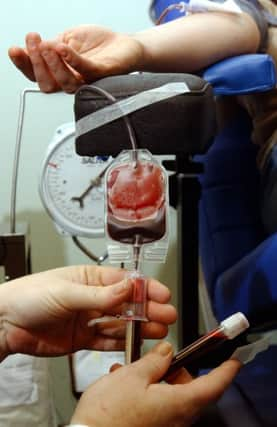Tainted blood victims raise fears after Penrose fallout


Scottish NHS patients who were given transfusions of infected blood in the 1970s and 1980s have been given fresh hope that people could be held responsible after the UK government announced a major inquiry into the scandal.
Prime Minister Theresa May yesterday promised justice to families of the 2,400 people believed to have died as a result of tainted blood, and thousands more still living with illnesses.
Advertisement
Hide AdAdvertisement
Hide AdHaemophiliacs and other patients across the UK given transfusions were infected with HIV and Hepatitis C in the 1970s and 1980s, largely due to the use of an plasma product imported from the United States and elsewhere.
Factor VIII was produced using blood from tens of thousands of donors, including American convicts who sold their blood, leading to widespread contamination.
No criminal charges have ever been brought, and no civil liability has ever been admitted in the UK.
The Prime Minister said the scandal was an “appalling tragedy” that should “simply never have happened”. She said the NHS had failed patients and that victims and their families “have been denied answers for too long”.
A 2015 inquiry ordered by the Scottish Government was criticised by families of victims when it made just one recommendation and did not apportion blame.
The inquiry by Lord Penrose cost £11.3 million, took six years to complete, and was branded a “waste of time and money” and a “whitewash” by victims and their families.
English contaminated blood campaigners yesterday said the outcome of the Penrose Inquiry was “totally unacceptable”.
The sudden announcement comes as Andy Burnham, the former Labour minister, had been preparing to publish evidence that allegedly showed victims had their medical records tampered with to conceal evidence of negligence.
Advertisement
Hide AdAdvertisement
Hide AdOpposition parties had also threatened to inflict defeat on the minority government in a Commons vote demanding a public inquiry.
The announcement came just two days after six party leaders in the House of Commons – including Labour leader Jeremy Corbyn and the Democratic Unionists’ Nigel Dodds – signed a joint letter calling for an inquiry.
Philip Dolan, a long-standing campaigner for haemophilia patients and a former convener of the Scottish Infected Blood Forum, voiced concern that an inquiry could interfere with a compensation fund set up in the wake of the Penrose Inquiry, which began making payments earlier this year.
Mr Dolan said victims in Scotland had “complained that more information should come to light, that Penrose missed out,” but accused Mrs May of “using contaminated blood and people who were so badly harmed to make an announcement, in the last days of parliament”.
Haemophilia Scotland chairman Bill Wright was infected by a blood product in 1986 and said he felt “somewhat deflated” after yesterday’s announcement. He told the BBC: “It’s something that we had hoped for many years ago, maybe 20 years ago, in terms of a UK-wide inquiry.
“But of course in Scotland we have since had the Penrose Inquiry, living through six years of very distressing and very disturbing evidence, and it’s a highly challenging experience to go through a public inquiry.”
Public health minister Philip Dunne told MPs in the House of Commons that the Penrose Inquiry and the release of files relating to NHS blood safety “do not go far enough to provide the answers that they want or to get to the truth of what happened”.
Mr Dunne added: “In the light of those concerns and of reports of new evidence and of allegations of potential criminality, we think that it is important to understand the extent of what is claimed and the wider issues that arise.”
Advertisement
Hide AdAdvertisement
Hide AdHe confirmed the inquiry would cover the whole of the UK as all known cases of contamination date back to the decades before devolution.
“We recognise that there is a legitimate interest for all constituent nations in the United Kingdom,” Mr Dunne told MPs. “As many of these incidents took place before devolution, we intend to consult devolved governments.”
However, the Scottish Government revealed it had not been given any warning of the announcement and said it was “very surprised” that it would cover the whole of the UK.
“We will be seeking clarity as a matter of some urgency,” a spokeswoman said.
Details of the inquiry’s structure, its remit, and its power to compel witnesses and the production of evidence, will be decided in consultation with victims’ groups and MPs who have been arguing on their behalf.
Mr Dunne said the government had not decided whether the inquiry should be chaired by a judge with full legal powers, or run by an independent panel along the same lines as the Hillsborough inquiry.